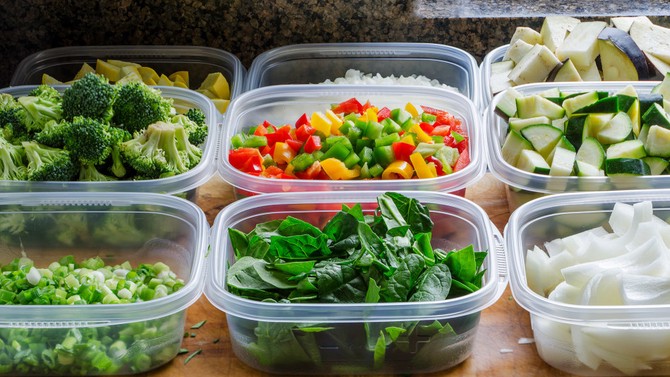6 Secrets of Women Who Can Eat Whatever They Want
...and still lose weight. These can be your secret weapons too.
By Emma Haak McKinley

Photo: iStock/filadendron
They Eat...but Within Reason
Your friend who seems to slim down effortlessly just ordered the lobster mac and cheese for dinner, and you just want to order a clue as to how she could possibly eat that and still lose weight. Here's the key: She's most likely not eating like that every day, let alone at every meal. Because the truth is that unless your favorite foods are sautéed veggies, lean proteins and avocado ice cream, it's not realistic to eat anything you want and lose weight. The key is to eat the things that bring you joy on occasion (that monthly Sunday brunch with friends, for example, or the occasional trip to your favorite ice cream shop), and eat healthfully the rest of the time. "I tell my clients this all the time," says Amy Shapiro, RD, founder of Real Nutrition in New York City. "You're not allowed to be the person who's out to dinner and isn't allowed to eat something. You can eat anything you want—you just can't eat it all at the same time or all the time."
Your takeaway: If you're out for a meal with friends or family and the four-cheese pizza is calling your name, order it. Just remember that if you do that too often, the number on the scale will start to creep in the wrong direction.

Photo: iStock/Ben6
They Get Back on Track Fast After They Indulge
Women who successfully lose weight and make it look easy don't let one less-than-healthy meal or snack spiral out of control. (We've all been there. That family-size bag of cheddar popcorn basically ate itself, so why not order takeout for dinner too?) Instead they get right back on track with the next thing they eat, says Shapiro. "Consistency is what gets you the results," she explains, "not the one-off blip."
Your takeaway: So you ate something that wasn't part of your healthy meal plan. Move on and instead of feeling guilty about it, think about the healthier options you could have for your next meal instead. Knowing exactly how you plan to get back on the horse will keep you from spiraling face-first into a package of peanut butter cups and help you feel in control of any cravings.

Photo: iStock/mapodile
They're the Stairs-over-Escalators Type
The gym isn't the only place you can burn calories, so having an active lifestyle can be a big help when you're trying to lose weight. "There's this idea of non-exercise activity and that's anything that's not really exercise," says Marisa Moore, RDN. "It could be that you always take the stairs instead of the elevator, or you get up more frequently to go to the bathroom because you're drinking a lot of water. All those things over time can contribute to you burning significantly more calories throughout the day."
Your takeaway: Getting regular exercise is important, but don't forget about how much you're moving when you're not exercising, per se. (Research suggests that when we focus on exercise as part of a weight loss plan, we may subconsciously move a lot less when we're not exercising, which can actually make it harder to drop pounds because we don't burn as many calories as we could.) Use tried-and-true strategies like parking in the farthest spot in the parking lot, getting off the subway one stop early and walking, and standing and moving around regularly throughout the day.

Photo: iStock/Bojan89
They Spend Time in That Other Part of the Gym Too
Yes, we're talking about the weight room, because that's where muscles are made. Muscle burns more calories at rest than fat, so the more you focus on strength training, the more your body will work toward your weight loss goal even when you're deep in a Netflix binge on the couch. That helps explain why "women who maintain their weight a little bit easier or lose weight a little more effortlessly tend to have a higher lean body mass," says Moore. People who followed a 12-week exercise program that combined aerobic workouts and strength training lost more weight and and more body fat (including abdominal fat) than those who did only aerobic or strength training workouts, according to a study in BMC Public Health.
Your takeaway: Make strength-building exercises a consistent part of your workout routine. Here are a few routines to try either at the gym or at home: one from Jennifer Lawrence's trainer, three no-equipment options you can do anywhere and a full-body workout you can do with one dumbbell. Just keep in mind that while focusing on your muscles may mean "you might have a little more wiggle room" with your diet, says Shapiro, it doesn't mean that you can now eat with reckless abandon.

Photo: iStock/Steve Debenport
They Don't Spend Their Days Thinking About Not Thinking About French Fries
If you want to make weight loss as painless a process as possible, you have to stop trying to control your own thoughts. Meaning it's time to put the kibosh on actively trying not to think about the foods you think you shouldn't be eating. "It becomes that forbidden fruit," says Moore, making you want it even more and more likely to give in and overeat it. In fact, one study in the journal Appetite found that women who were specifically told not to think about chocolate ate significantly more of it than women who were told to think about chocolate or not given any direction on their chocolate-related thoughts.
Your takeaway: It can be tricky not to think about french fries when you're trying not to eat so many french fries, but do your best to simply acknowledge the thought and let it pass rather than mentally berating yourself for even having the thought in the first place. And of course, if you really want the french fries, just have a few.

Photo: iStock/PeopleImages
They've Got Stress Management Down to a Science
We know—women who lose weight effortlessly also have low stress? Doesn't seem fair, but hear us out. Chronic stress can be an unexpected weight loss saboteur, so knowing how best to manage yours is key. "If you're living in a state of stress, like working at a tough job or dealing with a life change, your cortisol levels start to increase," explains Shapiro. "When cortisol increases, so does insulin. Insulin is our fat storage hormone so when insulin goes up, you start to store fat and it typically gets stored in your midsection." Shapiro says she sees it often with clients who seem to be doing all the right things to lose weight and yet find their waistlines literally expanding. When she sees that, "I ask about their stress levels," she says. (Want to know more about how stress affects the number on the scale? Here are seven ways stress makes you gain weight.)
Your takeaway: If you're chronically stressed, experiment to figure out what methods or strategies help you feel calmer and more in control. It could be meditation, exercise, getting more sleep (which can also help with weight management!), making time to read before bed instead of answering emails—whatever works best for you. Then incorporate the winning formula into your everyday life.
Published 04/27/2018

